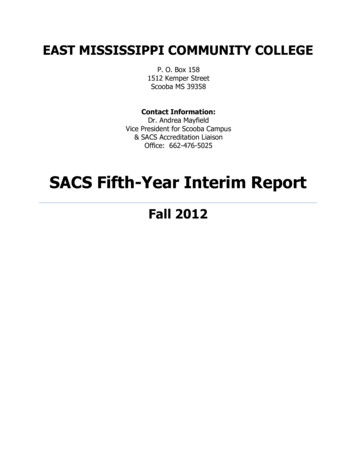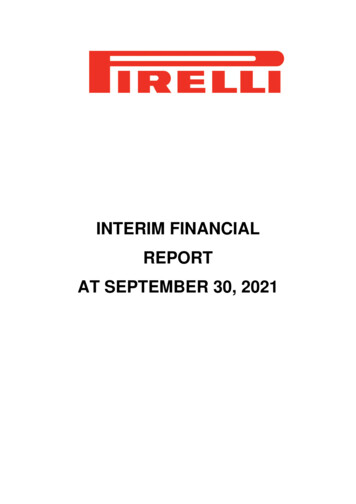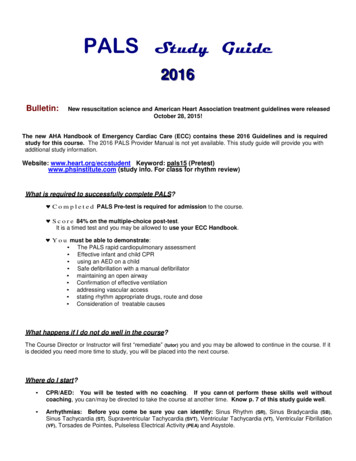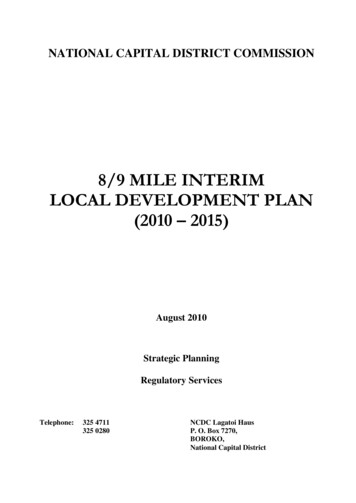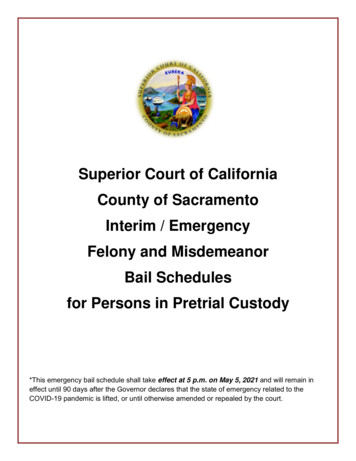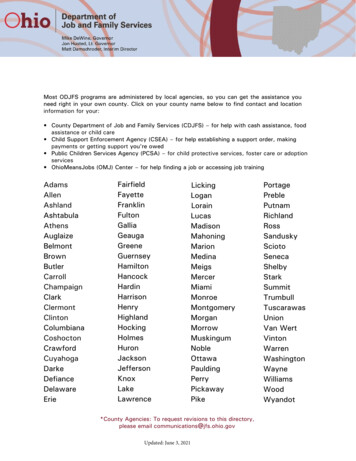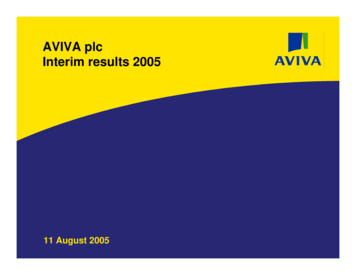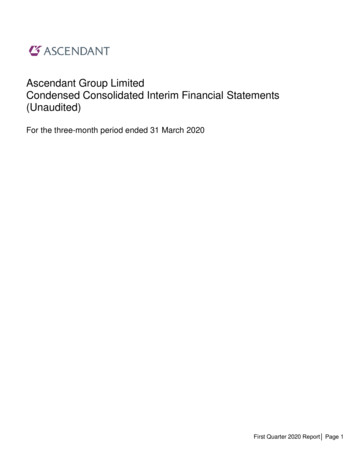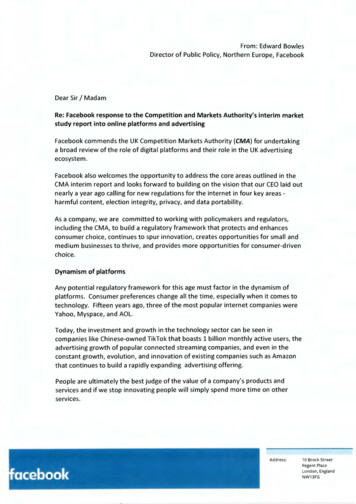
Transcription
From: Edward BowlesDirector of Public Policy, Northern Europe, FacebookDear Sir/ MadamRe: Facebook response to the Competition and Markets Authority's interim marketstudy report into online platforms and advertisingFacebook commends the UK Competition Markets Authority (CMA) for undertakinga broad review ofthe role of digital platforms and their role in the UK advertisingecosystem.Facebook also welcomes the opportunity to address the core areas outlined in theCMA interim report and looks forward to building on the vision that our CEO laid outnearly a year ago calling for new regulations for the internet in four key areas harmful content, election integrity, privacy, and data portability.As a company, we are committed to working with policymakers and regulators,including the CMA, to build a regulatory framework that protects and enhancesconsumer choice, continues to spur innovation, creates opportunities for small andmedium businesses to thrive, and provides more opportunities for consumer-drivenchoice.Dynamism of platformsAny potential regulatory framework for this age must factor in the dynamism ofplatforms. Consumer preferences change all the time, especially when it comes totechnology. Fifteen years ago, three of the most popular internet companies wereYahoo, Myspace, and AOL.Today, the investment and growth in the technology sector can be seen incompanies like Chinese-owned TikTok that boasts 1 billion monthly active users, theadvertising growth of popular connected streaming companies, and even in theconstant growth, evolution, and innovation of existing companies such as Amazonthat continues to build a rapidly expanding advertising offering.People are ultimately the best judge of the value of a company's products andservices and if we stop innovating people will simply spend more time on otherservices.Address:10 Brock StreetRegent PlaceLondon, EnglandNW13FG
The value of platforms for small businessesTechnology and digitalisation are a source of new opportunities for small andmedium businesses. To understand the role of Facebook in helping small businessesto grow, it commissioned a study by Copenhagen Economics which surveyed 7,000businesses across Europe, including the UK. In the study, businesses emphasised,among other things, the role of technology in helping them reach markets abroadand more specifically the study flagged that: our services helped these businesses generate over 98 billion euros inexports last year;seven in ten businesses using our services export to other countriescompared with five in ten for non-users; andsix in ten of the businesses surveyed say that our services are helpful inentering new markets .These are just a few of the benefits generated by our services. These benefits aresignificant and as the CMA considers regulatory intervention, it needs to weigh boththe innovation in the digital sector and the benefits this innovation delivers topeople and businesses; that innovation is both enabled and funded by advertising.Promoting user-driven choice and innovation within a new regulatory frameworkBuilding a new regulatory framework for the internet requires all stakeholders towork with government to outline a template that is resilient enough to providestrong rules for digital markets as a whole. Facebook's view is that new rules shouldgive consumers more control of their information and more choice whilst alsospurring growth and innovation.In the next few pages, our submission aims to:1. emphasise our commitment to more choice and transparency for consumersand advertisers, and its support for some of the CMA's initial policy proposalsrelated to consumer and advertising tools, data portability solutions andprivacy enhancement technologies;2. clarify misunderstandings about the competitive dynamics ofthe industryand mischaracterisation of aspects of our services. In particular, weunderscore the need for robust consideration of economic, legal andtechnical evidence to support some of the policy recommendations;3. identify that some of the CMA's preliminary policy proposals riskundermining a business model which drives considerable innovation andcreates benefits for consumers and small and medium businesses alike; and4. set out our initial considerations on the CMA's proposed Code of Conduct tothe extent there is evidence it is needed.Address:10 Brock StreetRegent PlaceLondon, EnglandNW13FG
In short, we welcome the opportunity to engage with the CMA as it designs andimplements well-evidenced regulation that is effective and pro-innovation, andwhich preserves the many benefits technology has and can deliver to people,advertisers and small businesses in the UK.Address:10 Brock StreetRegent PlaceLondon, EnglandNW13FG
UK CMA Online Platforms and DigitalAdvertising Market StudyFacebook’s response to the CMA’sInterim Report14 February 2020
1.Facebook welcomes the opportunity to address the preliminary impact assessment andpolicy proposals contained in the CMA’s Interim Report (the IR)1.1Recognising the "[i]nternet has entered a new phase”, Facebook understands that theoversight of technology’s role in our lives also needs to evolve. It is in this context that MarkZuckerberg, Facebook’s CEO, has called for a “more active role for governments andregulators” so that “by updating the rules for the internet, we can preserve what’s best aboutit – the freedom for people to express themselves and for entrepreneurs to build new things –while also protecting society from broader harms”. Against this background, Facebook notesthe broad economic, policy and legal frameworks set out in the IR; frameworks whichnecessarily extend beyond the parameters of competition law and policy.11.2Facebook looks forward to engaging with the CMA in its work to further develop the evidencebase for proportionate, industry-wide, thought-leading policy proposals that balance theinterests of all stakeholders and are workable in practice (whether as part of a Code ofConduct or otherwise). Consistent with the Government’s Better Regulation Framework,2there is a public interest in the CMA grounding any policy proposals for change on robustevidence of actual harm; and weighing any such harm against the substantial pro-consumerand business benefits that exist today. Such an approach provides legitimacy to any proposalsfor change and thus maximises the likelihood of success of any such proposals. Accordingly,Facebook sets out in more detail below its initial views on:1.3(a)the substantial benefits and efficiencies that its services bring to consumers,advertisers, publishers and the wider UK economy (see Section 2);(b)certain of the CMA’s preliminary proposals that Facebook considers risk deterioratingthe benefits of Facebook’s services and creating harm for all of its users, as well as thewider UK economy (see Section 3);(c)those of the CMA’s preliminary proposals that Facebook considers would best supportand contribute to improving transparency and user-initiated choice (see Section 4);and(d)any new Code of Conduct, to the extent that there is robust evidence that it isnecessary (see Section 5).Ahead of its final report, Facebook urges the CMA to take account of the points set out in thissubmission in order to ensure that any final policy recommendations:(a)12properly consider and reflect the substantial benefits and efficiencies that Facebook’sservices bring to all of its users. Consumers, advertisers, publishers and the wider UKSee for example, paras 5, 4.32 and 7.16 of the IR. See also the comments of the European Executive Vice President and CompetitionCommissioner Margrethe Vestager who has noted that “to tackle the challenges which the [sic] digital transformation creates forEurope, we also need to look beyond competition”: Security and trust in a digital world, Speech of 13 September 2019, available t-digital-world en.Department for Business, Energy and Industrial Strategy (BEIS), Better Regulation: Government’s Annual Report 2018-2019, November2019, available at: t/uploads/system/uploads/attachment ort-2018-19-updated-february-2020.pdf; and BEIS, Better Regulation Framework: Guidance, August2018, available ment/uploads/system/uploads/attachment ce-2018.pdf.2
economy all benefit from Facebook’s ad-supported business model. That modelprovides substantial surplus to consumers;31.4(b)are industry-wide, recognising the lack of any evidence of “market power” or causallink between any perceived market power and the alleged harms in the IR. After all,even based on an artificially narrow characterisation of the market in which Facebookcompetes,4 the CMA acknowledges Facebook’s market presence comprises less thanhalf of all online “display” advertising.5 Such an approach will help to deliver forwardlooking and meaningful change for all users;(c)avoid arbitrarily transposing frameworks from other industries (such astelecommunications and personal banking) to ad-funded platforms which operate ina significantly more competitive and innovative ecosystem.6 As recommended by BT(an experienced regulated entity), remedies must “appropriately reflect the specificfeatures of different sectors” and be “evidence-based, clear, limited to what isnecessary and proportionate; there should be appropriate checks and balances; andthe regime should be capable of adapting to a fast-moving sector”. In particular, theCMA “should apply the principles of good regulation – i.e. it should consider the costand benefits of regulation to all affected players and consumers”;7 and(d)recognise the inherent challenges involved in developing regulatory proposals thatseek to balance competing policy objectives, namely: (i) differentiation andinnovation between online platforms; (ii) standardisation and homogeneity resultingfrom interoperability between online platforms; and (iii) privacy of informationshared with online platforms.8 Any proposals must be harmonious with therequirements of existing regulation and legislation including, in particular, the GeneralData Protection Regulation (GDPR) and the Data Protection Act 2018.As the Interactive Advertising Bureau has also put it:“it’s imperative that the CMA protects the value our ad-funded digital economydelivers to users and the UK’s position as a world leading online ad market. Theinternet relies on digital advertising, underpinning business models that allow345678For example, third party research notes that consumers “derive over 1000 of value annually on average from Facebook”, see JayCorrigan, Saleem Alhabash, Matthew Rousu and Sean Cash, How much is social media worth? Estimating the value of Facebook bypaying users to stop using it, 19 December 2018, available id 10.1371/journal.pone.0207101&type printable; and Erik Brynjolfsson, Avinash Collisand Felix Eggers, Using massive online choice experiments to measure changes in well-being, 9 April 2019, available ull.pdf.See para 5.110 of the IR.In particular, the CMA has maintained antiquated and artificial segmentations between: (i) search and display advertising; (ii) videoand non-video advertising; and/or (iii) open and owned/operated display advertising, all of which are not reflective of market reality.See, for example, see Performance Market Insider, Pierre Kiciak, The Where and Why of Convergence Between Display and PaidSearch, June 6, 2016, available at: -why-convergence-between-display-andpaid-search/; and Matt Maltby, How Leading Advertisers Are Using Search for Brand Building, June 2014, available brand-building/. Moreover,the CMA has also acknowledged that the internal documents of Google and Facebook each clearly identify the other as a competitor(see paras 5.119-5.120 of the IR).See, for example, Competition Policy International, UK: Telecom Regulator fears lack of competition, 25 April 2019, available uk-telecom-regulator-fears-lack-of-competition/; Business Insider, UK regulators areaiming to increase banking competition, 16 August 2018, available at: ncialcomparison-rule-2018-8?r US&IR T; and CMA, Retail banking market investigation, 26 February 2016, available uk.Such notes of caution are particularly worth heeding when they are already emanating from regulated entities. See BT’s response tothe CMA’s Statement of Scope, 31 July 2019, paras 8 and 54, available 5d762a43e5274a097be1f56b/190731 BT - Response to statement of scope non-confidential Redacted.pdf.See para 4.158 of the IR.3
consumers to access information and services for free. It supports new businessgrowth and has allowed for the evolution of traditional markets, particularly in thecase of SMEs. Maintaining an open, robust and diverse digital ecosystem is essentialto ensuring a healthy and sustainable marketplace that retains the many benefits thatdigital advertising delivers to both individuals and businesses”.92.The CMA’s final policy proposals should fully take into account the substantial benefits thatFacebook’s constantly innovating and personalised services bring to consumers, advertisers,publishers and the wider UK economy2.1Facebook welcomes the CMA’s acknowledgment of the widely recognised benefits andefficiencies of Facebook’s personalised user and advertising services and its acknowledgmentthat Facebook has grown by competing to offer a better product than its rivals.102.2At its core, Facebook offers a personalised experience where all content, including ads, istailored to its individual users. Indeed, advertising content is an integral part of thepersonalised user experience on Facebook; and Facebook constantly strives to ensure that theads users see are as relevant and useful to them as non-paid content.2.3However, the full extent of the benefits of Facebook’s services are not recognised in the IR.This risks any well-meaning initiatives raising unforeseen challenges (or worse, creating harmfor all of Facebook’s users) by focusing only on perceived downsides, without sufficientlycounterbalancing these against the substantial pro-consumer benefits. As a result, Facebookurges the CMA to continue to engage in understanding the significant benefits and economicefficiencies generated by companies such as Facebook more fully. Such benefits andefficiencies are based on an ad-supported model that provides substantial surplus toconsumers at no cost.2.4The CMA’s final impact assessment and policy proposals must therefore properly reflect thefollowing substantial benefits that Facebook’s services – including the personalisedexperience which is inherent to those services – deliver to consumers, advertisers, publishersand the wider economy, and the impact that any change would imply.UK businesses, particularly SMEs, benefit significantly from Facebook’s services2.5Facebook’s personalised advertising services have helped to democratise advertising in theUK. Even just a few years ago, effective advertising was simply not an option for largenumbers of businesses in the UK: either because it was too expensive (for example, acommercial to air on prime-time TV) and/or too inefficient (for example, newspaper advertswhich would likely only be relevant to a fraction of a newspaper’s readers).2.6Today, Facebook’s efficient and affordable advertising services have transformed andenhanced effective advertising options available to businesses – particularly to SMEs – thusspurring economic growth and opportunity in the UK. Now, advertisers of all kinds and sizescan advertise and benefit from the affordable, innovative and efficient advertising solutionsthat Facebook has driven and brought to the market. These have enabled advertisers (andparticularly SMEs) to reach their target audience more efficiently and cost-effectively and thusachieve a greater return on their investment.910IAB UK’s response to CMA’s market study interim report, 18 December 2019, available at: e-cmas-market-study-interim-report.See the summary box on p. 6 of the IR.4
2.7The effect is that UK SMEs can, for example, now advertise and grow their businesses in amanner that has simply not been possible before, as a result of advertising on Facebook. Forexample:(a)SMEs can now reach their target audiences more efficiently and compete with andchallenge much larger, more established businesses more effectively, including inconcentrated industries; and(b)a recent study of SMEs using Facebook’s services in 15 countries across Europe,including the UK, noted that that:(i) 47% find Facebook’s apps important for starting their business;(ii) 59% find Facebook’s apps important to growing their revenues; and(iii) 58% find Facebook’s apps important in lowering their marketing costs.112.8Demand for Facebook’s personalised ads reflects their value and quality. This is supported byadvertisers benefitting from a greater degree of transparency and measurement of theirreturn on investment when advertising on Facebook than was previously available. Theseefficiencies are important for enabling Facebook to continue to compete to win a greaterproportion of all businesses’ advertising budgets, i.e. by continuing to demonstrate that thevalue of placing an ad on Facebook is better than that offered by other online and offlineadvertising channels.UK consumers also benefit significantly from Facebook’s services, all of which are only madepossible from revenue generated by Facebook’s advertising services2.9UK consumers derive substantial benefits from Facebook’s services. Indeed, there is agrowing body of economic research supporting Facebook’s delivery of valuable services tousers:2.10111213(a)one recent research study shows, for example, that digital goods, and in particularFacebook, have created large gains in wellbeing and consumer surplus, noting thatwhen confronted with the choice of either maintaining access to Facebook or givingup Facebook for one month, users would require a median compensation of 40-50per month for leaving the service;12 and(b)another research study used an experimental approach, based on the de-activationof Facebook accounts, to quantify the value that users place on Facebook. The resultsconsistently show users would require more than 1,000 annually to deactivate theirFacebook account.13But as users are aware, Facebook’s valuable services are funded entirely by advertisingrevenue. Accordingly, advertising (and in particular, personalised advertising) is not an “addon” service for consumers. Rather, it is an integral foundation for the multi-sided economicCopenhagen Economics, Empowering the European Business Ecosystem – an impact study of business using Facebook apps andtechnologies, 2020, available owering-the-europeanbusiness-ecosystem copenhagen-economics.pdfErik Brynjolfsson, Avinash Collis and Felix Eggers, Using massive online choice experiments to measure changes in well-being, 9 April2019, p. 3, available at: .pdf.Jay Corrigan, Saleem Alhabash, Matthew Rousu and Sean Cash, How much is social media worth? Estimating the value of Facebook bypaying users to stop u
efficiencies of Facebook’s personalised user and advertising services and its acknowledgment that Facebook has grown by competing to offer a better product than its rivals. 10. 2.2 At its core, Facebook offers a personalised experience where all con

